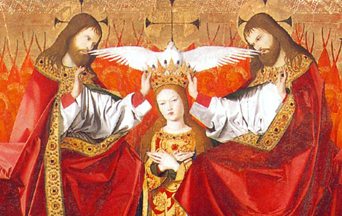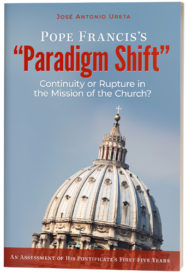
Pope Francis has once again confused, scandalized and disoriented the flock he is called to teach, guide and sanctify.
This time he has done it with the shocking statement—contrary to the Gospels, the Tradition of the Church and the common feeling of the faithful—that Mary Most Holy was a common, “normal girl” just like any young woman of today.
“A Normal Girl, a Girl of Today”
In his book-interview, from which the Italian daily Corriere della Sera1 published some excerpts, Francis says that the Blessed Virgin Mary was “a normal girl, a girl of today …. normal, normally educated, open to marrying, to having a family. …. Then, after conceiving Jesus, [she was] still a normal woman. …. Nothing was exceptional in her life, [she was] a normal mother: Even in her virginal marriage, chaste in that framework of virginity, Mary was normal. She worked, went shopping, helped her Son, helped her husband. Normal.”
“Normality Is to Live in the People and Like the People”
What does it mean to be “a girl of today”? One who is in harmony with today’s paganized and hedonistic world? Someone who follows today’s immoral and masculinized fashions? A feminist that does not tolerate the slightest difference between the sexes? In Francis’s typical style, the phrase is extremely ambiguous.
The key to understanding this minimization of the Mother of God and ours is found in Liberation Theology’s Marxist-inspired egalitarianism.
Francis explains what he understands by “normality”: “Normality is to live in the people and like the people.”
10 Razones Por las Cuales el “Matrimonio” Homosexual es Dañino y tiene que Ser Desaprobado
“Sin of Being Elite”
When a person or family stands out for their leadership gifts, administrative acumen, fortune, intellectual or artistic ability and spiritual qualities, they become an “elite” person or family. Now, according to Francis, this is tantamount to committing the “maximum sin,” which pleases Satan the most: the “sin of being elite.”
Indeed, the Holy Father states that the sin that “pleases Satan the most” is “the sin of the elite.” He explains: “The elite do not know what it means to live in the people, and when I speak of the elite, I do not mean a social class. I am speaking about an attitude of soul.”
To attenuate his assertion’s Marxist flavor, Francis makes a caveat: The “sin of the elite” is “an attitude of soul.” However, the description he just gave of this new “sin” is sociological: the elite “do not know what it means to live in the people.” As usual, he employs vague and disconnected notions, uttering confusing phrases difficult to understand.
“The Church Is People … and the Devil Likes the Elite”
The consequence of this series of confusing statements is that, by reducing in an egalitarian sense the notion of “people” to what Pope Pius XII called “the masses”2 and by giving this category an absolute moral value Pope Francis is drawing a theological conclusion from a Marxist sociological interpretation of people, in the strictest style of Liberation Theology.
FREE READ: Pope Francis’s “Paradigm Shift”
Hence, you have this Marxist-flavored, new egalitarian theology: “The Church is people, the people of God. And the devil likes the elite.”3
The implication is that whoever commits the so-called “sin of elite” would cease to belong to the Church for failing to “Live in the people and like the people” because that would not please God, but the devil.
Is it not paradoxical that a pontiff who does not exclude adulterers, practicing homosexuals and transgender individuals4 from the sacraments or his company and friendship goes about, so to speak, “excommunicating” those who have fallen into the “sin of the elite”?
The logical consequence of this egalitarian ecclesiology is a new, anti-elitist Mariology. The Mother of God could not have been elevated over other creatures for otherwise she would become “elite” and no longer “live in the people and like the people.”
And, instead of pleasing God, she would please the devil!
“A Normal Woman…. Nothing Exceptional in Her Life”
For Pope Francis, nothing special happened in the life of the Blessed Mother: “Then, after conceiving Jesus, [she was] still a normal woman. …. Nothing was exceptional in her life.”5
Eternal and Natural Law: The Foundation of Morals and Law
Nothing exceptional! Really? For Mary Most Holy to continue life as the Most Beloved Daughter of God the Father, Most Admirable Mother of God the Son, and Most Faithful Spouse of God the Holy Ghost—the titles Saint Louis de Montfort lists in True Devotion to Mary—is not something exceptional? Is being part of the Holy Family with her Divine Son and Saint Joseph, following Jesus’s preaching and interceding with Him to obtain the miracle at the wedding at Cana, to participate in His Passion and Death at the feet of the Cross as our co-redemptrix, to be the Immaculate Conception, the Mediatrix of All Graces, our Advocate, Mother of the Church, and Queen of Angels and Saints, is there nothing exceptional in all this? All of it is just being a “normal woman”?
“A Girl … Open to Marrying”
To say that Our Lady was “a girl … open to marrying, to having a family” runs counter the general opinion of Saints and Doctors, who sustain that Mary had already made a vow of perfect virginal chastity when the Annunciation took place. This is what they deduce from her question to the Angel Gabriel after being told that she would be the Mother of God: “How shall this be done, because I know not man?”6
Learn All About the Prophecies of Our Lady of Good Success About Our Times
The great exegete Cornelius a Lapide (d. 1637) explains:
“For I know not man. …. No other just reason for this excuse and hesitation on the virgin’s part can be adduced or supposed here but the moral impossibility resulting from the vow which the Blessed Virgin had taken before the angelic annunciation: this is the teaching of SS. Augustine, Gregory of Nyssa, Bede, Bernard, Anselm, Rupertus ….”7
In his treatise, De virginitate, Saint Augustine is categorical: Mary would not have asked the Angel that question “unless she had before vowed herself unto God as a virgin.”8
Saint Bernard is equally clear regarding the vow of virginity that Our Lady made: “He [God] granted childbirth to her, having first inspired her vow of virginity and filled her with the virtue of humility.”9
An Implicit Denial of Jesus’s Divinity?
Is the statement that Mary, Mother of Jesus, was a “normal girl,” a “girl of today,” a “normal woman” an implicit denial that her Son was truly God?
How could “a normal girl,” “a girl of today” who did not stand out among others on any account, have an exceptional Son, the Word Incarnate Himself? If Mary were entirely ordinary, so would have to be her Son.
Therefore, one cannot consider the Blessed Mother as a common woman, living an ordinary life.
Science Confirms: Angels Took the House of Our Lady of Nazareth to Loreto
Mary Most Holy Is the Masterpiece of Creation
Mary Most Holy is the masterpiece of Creation. Chosen by God to be the Mother of the Redeemer, as Pius IX says, she was Immaculate from her very first instance, preserved from all stain or sin.10
She is Theotokos—the Mother of God—as the Council of Ephesus defined.
Pope Pius XII says that no condition can be greater than that, as it “demands the fullness of Divine grace” and therefore confers on her “the greatest dignity and sanctity after Christ.”11
Church Fathers, Holy Doctors, and Popes have always considered her a “vessel of election;” and, in awe before such perfection, sanctity, and dignity, they exclaim: “De Maria nunquam satis.” That is to say, regarding Mary we will never say enough or know enough. No matter how much we contemplate her or study her privileges, much will remain unknown and unexplained.
FREE PDF Download: Pope Francis’s “Paradigm Shift”
Breaking with this tradition and running counter to the understanding of the Gospels, Pope Francis refers to the Mother of God as a common, “normal” woman. This also contradicts Pope Pius XII’s lapidary statement attributing to the Blessed Mother “the greatest dignity and sanctity after Christ.”
“O Heaven’s Glorious Mistress, Elevated Above the Stars”
The Holy Father’s view of Mary as unexceptional also clashes with the common sentiment of the faithful, and Catholic theological tradition and Liturgy. For example, the Roman Breviary’s Common of the Blessed Virgin Mary thus praises Mary Most Holy:
O Heaven’s glorious mistress,
elevated above the stars,
thou feedest with thy sacred breast
him who created thee.What miserable Eve lost
thy dear offspring to man restores,
the way to glory is open to the wretched
for thou hast become the Gate of Heaven.12
Footnotes
- Papa Francesco: “La Chiesa è popolo, l’élite il peccato,” Corriere della Sera, Oct. 7, 2018, https://www.corriere.it/cronache/18_ottobre_07/papa-francesco-chiesa-popolo-elite-peccato-2ab8a8ce-ca64-11e8-8417-701d201b7018.shtml.
- See Radiomessaggio di Sua Santità Pio XII ai Popoli del Mondo Intero* Dec. 24, l944, http://w2.vatican.va/content/pius-xii/it/speeches/1944/documents/hf_p-xii_spe_19441224_natale.html.
- The Church is the “People of God” not in a sociological meaning but in a spiritual one. It is the eschatological people of those who are baptized and profess the true faith and obey the legitimate shepherds.
- Sarah Pulliam Bailey and Michelle Boorstein, “Pope Francis met with a same-sex couple the day before he met with Kim Davis,” The Washington Post, Oct. 2, 2015, https://www.washingtonpost.com/news/acts-of-faith/wp/2015/10/02/pope-francis-reportedly-met-with-a-same-sex-couple-the-day-before-he-met-with-kim-davis/?utm_term=.e09a243c7349.
- The pope uses the word strane. An online Italian dictionary gives these synonyms for strano (feminine plural, strane): 1 extravagant, unusual, 2 little common, exceptional, 3 mysterious. Dizionario Italiano, https://www.dizionario-italiano.it/dizionario-italiano.php?parola=strano.
- Luke 1:34.
- The Commentary of Cornelius a Lapide – Saint Luke Chapter one (Fitzwilliam, NH: Loreto Publications, 2008), 158.
- Of Holy Virginity, no. 4, trans. C.L. Cornish, from Nicene and Post-Nicene Fathers, First Series, vol. 3, ed. Philip Schaff (Buffalo, NY: Christian Literature Publishing Co., 1887), rev. and ed. for New Advent by Kevin Knight, accessed Oct. 22, 2018, http://www.newadvent.org/fathers/1310.htm.
- St. Bernard of Clairvaux, Sermo 2: Opera omnia (Edit. Cisterc. 5 [1968], https://www.crossroadsinitiative.com/media/articles/mary-a-virgin-full-of-grace-and-virtues-bernard-of-clairvaux/.
- Pius IX, Bull Ineffabilis Deus (on the Immaculate Conception), Dec. 8, 1854, http://www.papalencyclicals.net/pius09/p9ineff.htm.
- Pius XII, Encyclical Fulgens Corona, Sept. 8, 1953, no. 11, http://w2.vatican.va/content/pius-xii/en/encyclicals/documents/hf_p-xii_enc_08091953_fulgens-corona.html.
- Breviary Hymns, http://kpshaw.blogspot.com/2014/08/o-gloriosa-domina.html.
